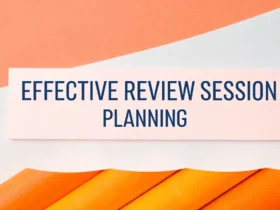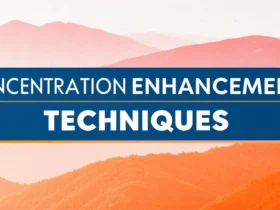Final exams loom. The pressure mounts. Maybe you toss and turn at night, picturing failure. Maybe you feel a knot in your stomach that just won’t loosen. You’re not alone. A study published in the journal Stress and Health found that over 40% of university students report experiencing moderate to high levels of stress during exam periods.
This isn’t just about nerves. This is about your well-being. But exam stress doesn’t have to cripple you. There are ways to manage it, to channel that energy into focus and success.
This article isn’t a magic wand. It’s a toolkit. We’ll explore proven methods for stress management during final exams, backed by science and designed for real students facing real pressure. We’ll cut through the fluff and get straight to strategies that work, so you can walk into those exams feeling prepared, confident, and in control.
Understanding Exam Stress: What’s Really Happening?
Exam stress isn’t just a feeling. It’s a complex physiological response. Let’s break it down.
The Science of Stress: Your Body’s Response
When you perceive a threat – like an upcoming exam – your body kicks into “fight-or-flight” mode. The hypothalamus, a tiny control tower in your brain, sets off an alarm. This triggers the release of stress hormones, including:
- Cortisol: The primary stress hormone. It increases blood sugar levels, suppresses the immune system, and prepares your body for action. While short bursts of cortisol can be helpful, chronic elevation can lead to anxiety, depression, and other health problems.
- Adrenaline: Also known as epinephrine. This hormone increases your heart rate, blood pressure, and energy supply. It’s what gives you that jolt of energy when you’re stressed, but it can also cause restlessness and irritability.
These hormonal changes can manifest in a variety of physical and emotional symptoms, including:
- Increased Heart Rate: That pounding feeling in your chest.
- Muscle Tension: Tight shoulders, clenched jaw, headaches.
- Digestive Issues: Nausea, stomach aches, diarrhea.
- Sleep Disturbances: Insomnia, difficulty falling asleep or staying asleep.
- Anxiety and Worry: Excessive fretting about the exam outcome.
- Difficulty Concentrating: Trouble focusing on studying.
- Irritability: Feeling easily frustrated and snapping at others.
Common Sources of Exam Stress
Pinpointing the root cause of your stress is the first step to managing it. Exam stress often stems from a combination of factors:
- Fear of Failure: The pressure to perform well and meet expectations.
- Lack of Preparation: Feeling unprepared or overwhelmed by the amount of material.
- Time Management Issues: Difficulty balancing studying with other commitments.
- Perfectionism: Setting unrealistically high standards.
- High Stakes: Believing the exam outcome will determine your future.
- Competition: Feeling pressured to outperform your peers.
Debunking the “Good Stress” Myth
You might have heard that some stress is good. It’s true that a little pressure can be motivating, but it’s a fine line. Eustress, or “good stress,” enhances focus and performance. Distress, or “bad stress,” impairs cognitive function and negatively impacts well-being.
The key is to manage stress levels so they remain in the eustress zone. When stress becomes chronic and overwhelming, it crosses over into the distress zone, hindering your ability to learn and perform effectively.
Building Your Stress Management Toolkit: Practical Strategies
Now, let’s get to the heart of the matter: what you can do to manage exam stress. These strategies are divided into several key areas:
1. Effective Study Habits: Conquering the Content
A solid study plan is your best defense against exam stress.
- Create a Realistic Study Schedule: Don’t cram. Space out your study sessions over several days or weeks. Allocate specific time slots for each subject. A study published in Educational Psychology Review demonstrates that spaced repetition enhances long-term retention.
- Break Down the Material: Divide large topics into smaller, more manageable chunks. This prevents overwhelm and makes it easier to track your progress.
- Prioritize and Focus: Identify the most important concepts and focus your energy there. Don’t waste time on less relevant material. Use past papers, syllabus outlines, and professor guidance to identify key areas.
- Active Recall and Practice Testing: Don’t just passively read your notes. Actively test yourself. Use flashcards, practice questions, or create your own quizzes. A study in Science found that retrieval practice is more effective than rereading for long-term learning.
- Find Your Ideal Study Environment: Some people study best in a quiet library. Others prefer background noise. Experiment to find what works for you. Eliminate distractions like social media and your phone.
- Take Regular Breaks: Don’t study for hours without a break. Short, frequent breaks can improve focus and prevent burnout. The Pomodoro Technique (25 minutes of focused work followed by a 5-minute break) is a popular method.
2. Time Management: Taking Control of Your Schedule
Feeling overwhelmed by a lack of time is a major stress trigger. Mastering time management is essential.
- Prioritize Tasks: Use a planner, to-do list, or digital app to prioritize your tasks. Focus on the most important and urgent items first.
- Estimate Time Requirements: Be realistic about how long each task will take. Don’t underestimate the time needed for studying, eating, sleeping, and relaxing.
- Delegate or Eliminate: If possible, delegate tasks to others or eliminate non-essential activities.
- Use a Time Management Matrix: The Eisenhower Matrix (also known as the Urgent-Important Matrix) helps you categorize tasks into four quadrants: Urgent/Important, Not Urgent/Important, Urgent/Not Important, and Not Urgent/Not Important. Focus on tasks in the Urgent/Important and Not Urgent/Important quadrants.
3. Mindfulness and Relaxation Techniques: Calming Your Mind
Mindfulness and relaxation techniques help to reduce stress by calming your mind and body.
- Deep Breathing Exercises: Simple breathing exercises can quickly reduce stress. Try the 4-7-8 technique: inhale for 4 seconds, hold for 7 seconds, exhale for 8 seconds. Repeat several times.
- Meditation: Regular meditation can reduce anxiety and improve focus. There are many guided meditation apps and online resources available.
- Progressive Muscle Relaxation: This technique involves tensing and releasing different muscle groups in your body. It helps to relieve muscle tension and promote relaxation.
- Yoga: Yoga combines physical postures, breathing exercises, and meditation. It can reduce stress, improve flexibility, and promote overall well-being. A meta-analysis published in the Journal of Alternative and Complementary Medicine found that yoga is effective for reducing stress and anxiety.
- Mindfulness Activities: Engage in activities that bring you into the present moment, such as coloring, listening to music, or spending time in nature.
4. Physical Health: Nourishing Your Body
Your physical health is directly linked to your mental health. Taking care of your body is essential for managing stress.
- Get Enough Sleep: Aim for 7-8 hours of sleep per night. Sleep deprivation can impair cognitive function and increase stress.
- Eat a Healthy Diet: Avoid processed foods, sugary drinks, and excessive caffeine. Focus on fruits, vegetables, whole grains, and lean protein. A study published in Health Psychology found that a healthy diet is associated with lower levels of stress.
- Exercise Regularly: Physical activity is a powerful stress reliever. Aim for at least 30 minutes of moderate-intensity exercise most days of the week.
- Stay Hydrated: Dehydration can worsen stress symptoms. Drink plenty of water throughout the day.
- Limit Caffeine and Alcohol: These substances can exacerbate anxiety and sleep problems.
5. Cognitive Restructuring: Changing Your Thoughts
Your thoughts play a significant role in how you experience stress. Cognitive restructuring involves identifying and changing negative thought patterns.
- Identify Negative Thoughts: Pay attention to the thoughts that trigger your stress. Are you thinking things like, “I’m going to fail” or “I’m not smart enough?”
- Challenge Negative Thoughts: Ask yourself if these thoughts are based on evidence or simply assumptions. Are there alternative, more positive ways to view the situation?
- Replace Negative Thoughts with Positive Ones: Replace negative thoughts with realistic and positive affirmations. For example, instead of thinking “I’m going to fail,” think “I’ve studied hard, and I’m prepared to do my best.”
- Practice Gratitude: Focus on the things you’re grateful for in your life. This can help to shift your perspective and reduce stress.
6. Social Support: Connecting with Others
Connecting with others can provide emotional support and reduce feelings of isolation.
- Talk to Friends and Family: Share your concerns with people you trust. Just talking about your stress can be helpful.
- Join a Study Group: Studying with others can provide support, motivation, and a chance to learn from each other.
- Seek Professional Help: If you’re struggling to manage stress on your own, consider talking to a counselor or therapist. Cognitive Behavioral Therapy (CBT) is an effective treatment for anxiety and stress. According to the American Psychological Association, CBT helps patients learn to identify and change negative thinking patterns and behaviors.
7. Setting Realistic Expectations: Embracing Imperfection
Perfectionism can be a major source of exam stress. Setting realistic expectations is essential for managing stress.
- Accept That You Can’t Know Everything: It’s impossible to master every detail of the material. Focus on the most important concepts and be okay with not knowing everything.
- Focus on Progress, Not Perfection: Celebrate small victories and acknowledge your progress. Don’t get discouraged by setbacks.
- Set Achievable Goals: Break down large goals into smaller, more manageable steps.
- Challenge Perfectionistic Thoughts: Recognize that making mistakes is part of the learning process.
- Practice Self-Compassion: Treat yourself with kindness and understanding, especially when you’re struggling.
8. Creating a Supportive Environment: Minimizing External Stressors
Your environment can significantly impact your stress levels. Create a supportive environment that minimizes external stressors.
- Minimize Distractions: Create a dedicated study space that is free from distractions.
- Establish Boundaries: Let others know when you need quiet time to study.
- Optimize Your Study Space: Make sure your study space is well-lit, comfortable, and organized.
- Limit Exposure to Negative Influences: Avoid spending time with people who are negative or stressful.
Tailoring Your Approach: Finding What Works for You
Not every stress management technique will work for every person. Experiment to find what works best for you.
- Keep a Stress Journal: Track your stress levels, triggers, and coping mechanisms. This can help you identify patterns and develop a personalized stress management plan.
- Try Different Techniques: Don’t be afraid to try different techniques and see what resonates with you.
- Be Patient: It takes time and practice to develop effective stress management skills.
- Seek Professional Guidance: If you’re struggling to find what works for you, consider talking to a counselor or therapist.
Common Mistakes to Avoid: Steering Clear of Pitfalls
While trying to manage stress, students sometimes fall into traps that worsen the problem. Here’s what to avoid:
- Procrastination: Putting off studying until the last minute only increases stress.
- Cramming: Trying to learn a large amount of material in a short period of time is ineffective and stressful.
- Ignoring Your Needs: Neglecting sleep, nutrition, and exercise can exacerbate stress symptoms.
- Isolating Yourself: Cutting yourself off from social support can increase feelings of loneliness and anxiety.
- Relying on Unhealthy Coping Mechanisms: Turning to drugs, alcohol, or other unhealthy behaviors can provide temporary relief but ultimately worsen stress.
- Comparing Yourself to Others: Comparing your progress and performance to others can increase anxiety and undermine your confidence.
Beyond the Exam: Building Long-Term Resilience
Stress management isn’t just about surviving final exams. It’s about building long-term resilience and developing healthy coping mechanisms that will serve you well throughout your life.
- Practice Self-Care Regularly: Make self-care a priority, not an afterthought. Schedule time for activities that you enjoy and that help you to relax and recharge.
- Develop a Strong Support System: Cultivate relationships with people who provide emotional support and encouragement.
- Learn to Manage Your Time Effectively: Time management skills are essential for reducing stress and achieving your goals.
- Set Realistic Expectations: Avoid setting unrealistic goals or striving for perfection.
- Practice Mindfulness and Relaxation Techniques: Incorporate mindfulness and relaxation techniques into your daily routine.
- Seek Professional Help When Needed: Don’t hesitate to seek professional help if you’re struggling to manage stress or other mental health issues.
Should You Get More Sleep Instead of Studying?
The night before a final. A question that has made students lose sleep over the possibility of getting little to no sleep.
The decision to prioritize sleep over studying is a personal one. If you’re well prepared for the exam, getting a good night’s rest might be more beneficial. Sleep helps with memory consolidation and cognitive function. According to the National Institute of Neurological Disorders and Stroke, sleep is crucial for learning and memory.
However, if you feel underprepared, a few extra hours of studying might ease your anxiety. Consider your level of preparedness and how well you handle stress.
Final exams are tough, no doubt. But you don’t have to let stress take over. By understanding the science behind exam stress and implementing these practical strategies, you can manage the pressure, optimize your performance, and protect your well-being. Remember, it’s not just about the grade; it’s about the journey.















Leave a Reply
View Comments